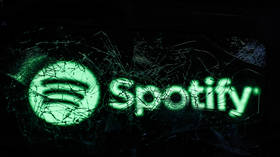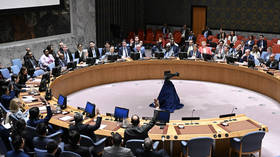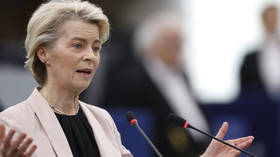Spotify announces Russia exit date

Russians will not be able to use Spotify starting next Monday, the Swedish audio streaming service announced on Thursday. The imminent withdrawal was first revealed in late March, with a new law regarding fake news cited as the reason.
Users from the world's largest state can continue using their accounts if they are living outside of Russia or move out of the country in the future, Spotify said. Doing so will require changing the residency setting in their profile, though users with premium subscriptions will have to wait until next week to do so, it said.
The popular service announced the decision to leave Russia two weeks ago. It said it had to do so due to the newly-adopted Russian law, which criminalizes the intentional publication of false information about the actions of Russia’s armed forces.
Spotify said the law runs contrary to its goal of providing “trusted, independent news and information” on its platform, and said it had to protect its employees and listeners from potential prosecution.
The law came in the wake of the crackdown on Russian media by Western nations and US-based tech giants such as Google, Facebook, and Twitter. RT and Sputnik were banned from broadcasting and publishing news through social media in most of Europe, with similar restrictions imposed by the US and some of its non-European allies. The gagging was justified as a fight against ‘Russian propaganda’, after Moscow launched its military operation in Ukraine in late February.
Moscow imposed restrictions of its own. Some Russian-language, foreign-funded media outlets were stripped of their licenses in Russia, while US-based social media platforms faced a crackdown. Meta, the parent company of Facebook and Instagram, was ruled by a Russian court to be an extremist organization, following a policy change which allowed users in some countries to advocate violence against Russian troops.
Many Western media outlets suspended operations in Russia after the fake news law was passed in March, but some, like Britain’s BBC or Italy’s RAI later returned.
Moscow attacked the neighboring state in late February, following Ukraine’s failure to implement the terms of the Minsk agreements signed in 2014, and Russia’s eventual recognition of the Donbass republics of Donetsk and Lugansk. The German and French brokered Minsk Protocol was designed to regularize the status of the regions within the Ukrainian state.
Russia has now demanded that Ukraine officially declare itself a neutral country that will never join the US-led NATO military bloc. Kiev insists the Russian offensive was completely unprovoked and has denied claims it was planning to retake the two regions by force.













